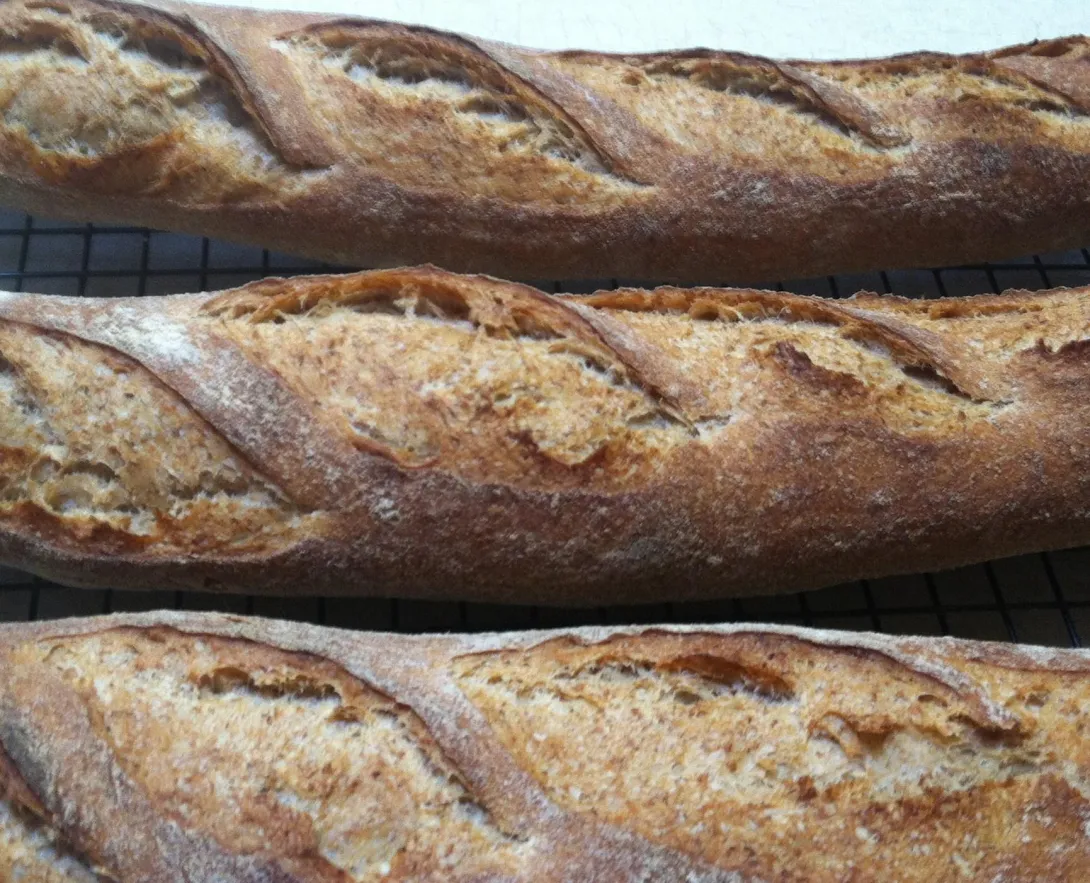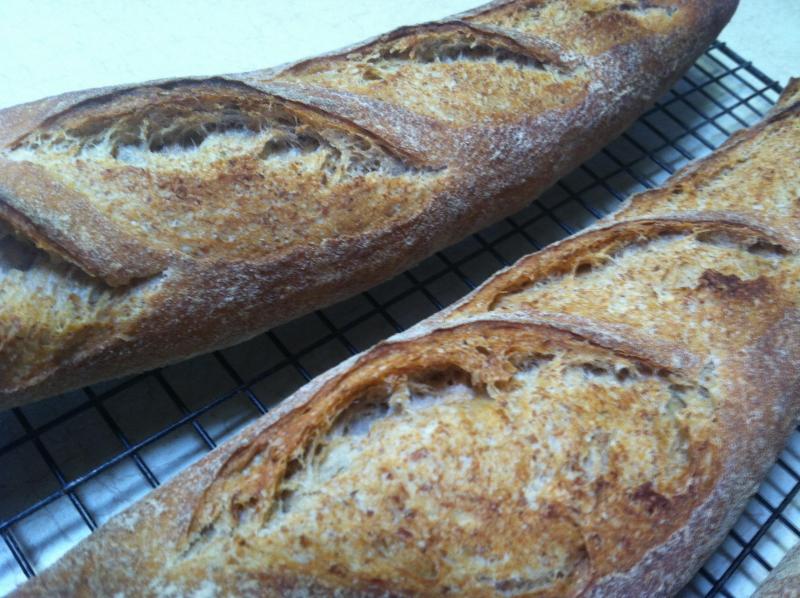
So at first I intended to use some local rye to make a Ryeguette. A few years back in San Fran I believe at the main La Boulangerie I had a light rye baguette with pistachios that I just loved. I've been meaning to create a rye baguette since and its been a long time coming. Well I ran out of Central Millings Baker's Craft which I was going to blend 70/30 with the local rye. I had to go buy more flour (I usually buy from my work at good prices/bakers perk) I noticed King Arthur's whole white hard wheat and had to go with that. I changed the whole plan and went with 50% central milling bakers craft, 30% local whole ground rye, and 20% KAF Whole Hard White Wheat. I hydrated each flour individually as has been the way I find my hydration these days. So White was hydrated at 69% Wheat at 75% (wasn't sure how this flour acted sure could be 80%), and the Rye at 80%. Overall i landed at 73.3% hydration. 12 hour bulk ferment in the fridge. Take out for 30 minutes, stretch and fold, rest 1 hour. Divided at 350 g and got 6 lovely baguettes.
My stone measures 20x15 and I really prefer a longer baguette but then I'm loading them sideways which is such a bad thing for maintaining shape. they like to curl a bit. I'll have to get over it and make smaller shorter baguettes and load the long way. None the less only a cosmetic issue. The bread has a wonderful smell. A crunchy crust which I'm betting will become chewy. I also bet these will actually be quite edible for more than just 4 hours and maybe a full day.
The formula
For 6 baguettes @ 350g each.
Levain
100 g ripe white starter (I like to use it right after a build so essentially this is a second build) @ 100%
105g Malted Bread Flour
45 g Whole stone ground rye
150 g h20
---------------------------------------
4 hours
Dough:
450g Malted Bread Flour
283.5g KAF Whole Hard White Wheat Flour
316.5 g Whole Stone Ground Rye
734 g H20
26 g Himilayan Sea Salt (the pink stuff)
5 g Instant Yeast (can be left out if desired and the final proof time may be a bit longer)
--------------------------------------------
1) "autolyse" flour water and levain for 30 minutes
2) Add yeast and combine
3) Add salt and continue mixing on low medium for 7 minutes.
4) turn up to medium and devlop dough completely
5) Place in greased container and retard overnight (12 hours)
6) Pull from retarder let rest 30 minutes and then do a good stretch and fold. Relax 1 hour.
7) Divde and preshape let rest for 20-30 minutes (this dough was strong so I could have rested longer)
8) Shape and place on floured couche seams up. Proof 1 hour in warm room.
9) Bake at 500 with steam for 10 minutes and vented for 20 more.
cool and enjoy


All in all I might adjust hydration upwards to find the sweet spot. Fantastic taste.
happy baking all
josh
- Anonymous's Blog
- Log in or register to post comments
at least when it comes to eating them, since so many are so bland. These, I could happily sink my teeth into. I'm very impressed at how open the crumb is for a 50% whole-grain bread. You are doing something--no--a bunch of somethings right, Josh.
Paul
I too was surprised by the crumb. cold bulk fermenting at work I presume. i life a good white baguette but as I delve deep into more whole grain I miss the flavor they add. So I agree with you hence my desire for a rye baguette that became this. It's pretty easy formula and I suggest you give it a ride.
josh
I was just wondering what to do next with my rye flour, and I think I need to try this out. These look great. Very nice bake!
Brett
this is a baguette i could eat for health reasons plus it might taste pretty good too! Well done I'm going to try bulk retarding these rather than shaping, retarding and not havng any room in the fridge to so it. Ike how you do a S&F out of the fridge before shaping too. These are plenty open for the amount of wholesomeness in them. Nice job Josh!
Happy baking
These are bulk retarded and proofed at room temp.
Josh
your recipe, Usually i have to make room for shaped loaves which is a pain and now there is no need to do it with a bulk retard like your method,
I would echo Paul's comments and add my compliments on your scoring.
It isn't traditional, but I've become a fan of sourdough baguettes with increased whole grain flours. You get the increased crust:crumb ratio and more complex flavor. And there are the heath benefits, of course.
David
Thanks David.
youll note that there is.5% yeast added here. A levain is built and bulk retard for flavor profile but full sourdough baguettes always tend to get too chewy for me. I know it's sad but I like yeast in my baguettes.
these are delicious still crunchy 7 hours later. Thank you while grains.
Josh
Excellent scoring and crumb structure for a 50 wholegrain baguette. Outstanding results, Josh!
-Khalid
Everyone had said it out loud, marvelous for 50% wholegrain baguette!! inspiring.. gonna try this soon
thank you very much for sharing
evon
those are beauties ! I have started a folder of just baguette formulas from TFL. I wasn't happy with the ones I was making so I am going to go through this portfolio on a weekly basis and see what I can replicate. THANKYOU for the complete detailed report. c
How do you determine how much water each different flour will absorb? Is there a relatively simple way to figure this out for home baking? I am very curious as I've run into some hydration issues recently. Many thanks for any help.
Well that's kind of a question without 1 answer. One hard red winter wheat will have different hydration characteristics than another. Same for other flours. Essentially though I'll break my recipe down and hydrate each flour as I'd like to see it come out. For this dough I hydrated my white flour at 69% (because it made such a fantastic white baguette last week) but white flour can be hydrated as low as 50% (for bagels/pretzels) and up to 100+% for ciabattas) and all the % in between. Being comfortable with my "white flour" I can imagine the variations at different hydration throughout.
It seems the rule of thumb on whole rye flour is around 80% but depending on what you are seeking and the other ingredients this can also be altered in either direction.
For Hard Red Winter Wheat my minimal hydration level would be around 75% but I've worked upwards towards 100%.
I am not so familiar with the White wheat so i went with the 75% as a good starting point. Although I loved my results I do believe they could possibly be improved if I raised that towards the 80% range. I really won'e know that particular flour until I work with it more exclusively (or at least as the only whole grain added to white flour)
So I suppose there are some basic "rules of thumb" but after that it depends on the particular flour and formula/desired result. What I'm doing with my mixed grain breads is finding the total hydration by figuring the math to hydrate each flour at a desired % and then adding the total. This makes the total hydration less important to me. I actually want to do an experiment and autolyse each flour individually with its water and then blend all with the levain and see if even more improved results occur. Reason being if I do as I have been yet throw them all together they still don't get the chance to absorb their set rate of water. If I segregated each with its set rate of water then they would. Silly.
Sorry now I'm rambling. Long day of work.
What hydration issues are you running into?? Maybe I can answer that more simply.
Josh
Your too kind. I look forward to others results and variations on the theme. It was mighty delicous.
A baguette I'd like to eat;
Nice one Josh
Andy
Hi Josh,
Your post today reminded me I'd meant to leave a comment regarding these gorgeous baguettes.
As Andy said, "a baguette I'd like to eat".
Bookmarking your post and really looking forward to trying to make beautiful baguettes like these, one day!
:^) breadsong